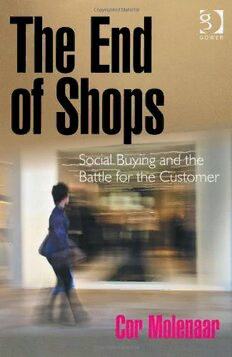
The End of Shops: Social Buying and the Battle for the Customer PDF
Preview The End of Shops: Social Buying and the Battle for the Customer
The End of Shops Social Buying and the Battle for the Customer Cor Molenaar The End of Shops For retailers it is a struggle of line: adapt to customer behaviour of close the shop The End of Shops Social Buying and the Battle for the Customer Cor MolEnaar © Cor Molenaar 2013 All rights reserved. No part of this publication may be reproduced, stored in a retrieval system or transmitted in any form or by any means, electronic, mechanical, photocopying, recording or otherwise without the prior permission of the publisher. Cor Molenaar has asserted his moral right under the Copyright, Designs and Patents Act, 1988, to be identified as the author of this work. Published by Gower Publishing Limited Ashgate Publishing Company Wey Court East 110 Cherry Street Union Road Suite 3-1 Farnham Burlington, VT 05401-3818 Surrey, GU9 7PT USA England www.gowerpublishing.com British Library Cataloguing in Publication Data Molenaar, Cor. The end of shops : social buying and the battle for the customer. 1. Consumer behavior. 2. Teleshopping. 3. Retail trade. 4. Retail trade--Technological innovations. I. Title 658.8’7-dc23 Library of Congress Cataloging-in-Publication Data Molenaar, Cor. The end of shops : social buying and the battle for the customer / by Cor Molenaar. p. cm. Includes bibliographical references and index. ISBN 978-1-4094-4974-4 (hbk) -- ISBN 978-1-4094-4975-1 (ebk) 1. Electronic commerce. 2. Internet marketing. 3. Teleshopping. 4. Retail trade. 5. Consumer behavior. I. Title. HF5548.32.M647 2013 658.8’72--dc23 2012035591 ISBN 978 1 4094 4974 4 (hbk) ISBN 978 1 4094 4975 1 (ebk – PDF) ISBN 978 1 4094 6502 7 (ebk – ePUB) V Contents List of Figures and Tables vii About the Author ix Introduction 1 1 The End of Shops? Why It Is No Longer Necessary to Go to a Shop! 3 2 The New Buying Behaviour: The Consumer of Today 11 3 Is There Still a Future for Shops? The Battle Has Commenced, with Suppliers, Customers and the Internet 35 4 Webshops: The Future for Retail? The Grass Is Always Greener on the Other Side 65 5 Technology and Retail: In Times of Change You Have to Get to Know Your Customers 97 6 New Concepts, New Opportunities: You Can’t Change the Past, but You Can Change the Future! 123 7 The End of Shops? A Fable or Reality? 147 Research on Retailing and Web Retailing 161 Conclusion: Fundamental Changes Needed for Retailing 171 Afterword: Save the Shops – Ten Ways to Attract Customers 181 Index 191 www.gowerpublishing.com/ebooks We hope you enjoy this ebook with its interactive features and the wealth of knowledge contained within it. We’d love to keep you informed of other Gower books available to you from your chosen provider. Why not join our monthly email newsletter? It features new books as they are released, links you to hints and tips from our expert authors and highlight free chapters for you to read. To see a sample copy, please go to www.gowerpublishing.com/newsletter and then simply provide your name and email address to receive a copy each month. If you wish to unsubscribe at any time we will remove you from our list swiftly. Our blog www.gowerpublishingblog.com brings to your attention the articles and tips our authors write and, of course, you are welcome to comment on anything you see in them. We also use it to let you know where our authors are speaking so, if you happen to be there too, you can arrange to meet them if you wish. List of Figures and Tables Figures 2.1 The new buying model (ORCA) 14 C.1 New retail model based on integration with the internet 175 A.1 The 80–20 rule in retail 185 A.2 New retail model based on integration shop/internet 186 A.3 The customer can decide how they will shop 189 Tables 1.1 Difference between shopping and retailing 4 1.2 Summary of Chapter 1, the difference between traditional retail and new opportunities 10 2.1 Summary and conclusion 33 3.1 Development of traditional ‘profit drivers’ 37 3.2 Conclusion and summary 63 4.1 Problems of physical shops compared to webshops 77 4.2 Conclusion and summary 95 5.1 Impact of development and technology on the retail sector 121 6.1 Conclusion and summary 145 7.1 Conclusion and summary 159 C.1 The new retail model 173 This page has been left blank intentionally About the Author Professor Cor Molenaar is Professor by Special Appointment of e-Marketing and Distance Selling at RSM/Erasmus University in Rotterdam. He is also the chairman of the Stichting Certificering Thuiswinkelwaarborg (Home Shopping Guarantee Hallmark) and chairman of the RFID platform in the Netherlands. He is also involved with the NIMA, the Dutch Institute for Marketing, as a member of the Examination Board charged with (among other things) the e-marketing of exams. He is director of the strategic advice bureau eXQuo Consultancy in Oosterbeek, the Netherlands. In this function he advises and supports businesses of various sizes from different markets such as financial institutes, manufacturers, retail organisations and service companies. He also organises workshops, boardroom sessions and in-company training sessions. He gives many lectures, both at home and abroad. He is the author of a number of books. Prior to the book The End of Shops he published eStrategy (2000) and Shopping 3.0 (2010). For higher education and university students he also wrote the textbook eMarketing (2010). The chair in e-Marketing and Distance Selling at the RSM/Erasmus University has been made possible by Cap Gemini, Hybris Software, GFK marktonderzoek and Thuiswinkel.Org (sub sponsors: Achmea, Bol.nl, Conrad electronics, ECI, Sundio/Sunweb, Wehkamp.nl). More information about Cor Molenaar can be found at the following websites: www.cormolenaar.nl www.eindevandewinkel.nl
